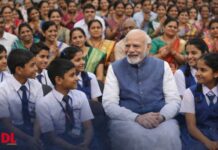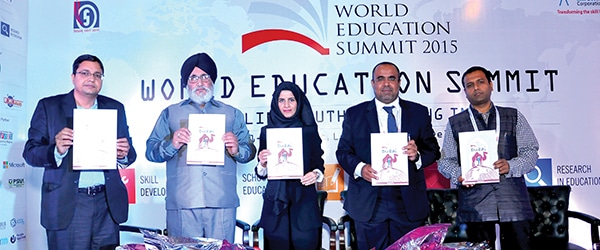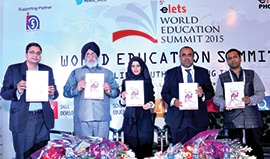
Skill development is one of the primary mandates of the Narendra Modi Government, looking to transform the skill gamut in the country. The country has an opportunity to reap the potential demographic dividend and the government has recognised this need and had launched the Skill India mission. With an ambitious target of making India a skilled one, the session discussed the vision and focus of the Central Government and the States as they embark upon this ambitious mission
Kalthoom Al Balooshi, Executive Director, Education Development, Knowledge and Human Development Authority, Dubai:
The opportunities for the growth and development of education in Dubai are immense and also crucial for the progress of the country. As the nation is the centre of trading and transit, the industry of higher education started with traders, businessmen coming from far across, from India, for spice, clothing among others. They became a community and this community needed a school in Dubai. So, to serve them the schools were initiated, providing the Indian community curriculum.
There are now 2,55,000 students from 120 different nationalities that represent the citizenship in Dubai. Thirty one schools are offering Indian curriculum for 80,000 students. The nation caters to 13 per cent of school market and 30 per cent of student market. Seeing the growth currently at 5-7 per cent every year, upto 2020, we are expecting 70 new schools, where 40 per cent will offer Indian curriculum.
 Dr Abdullah Al-Shibli, Director General of the Colleges of Applied Sciences, Ministry of Higher Education, The Sultanate of Oman:
Dr Abdullah Al-Shibli, Director General of the Colleges of Applied Sciences, Ministry of Higher Education, The Sultanate of Oman:
Regarding skills in higher education and challenges, one of the crisis is gaps, one is between the school leader and skill for higher education and the other is gap between the education institution and the skill for the particular job. We have Oman accredited institutes to see quality and make sure they provide quality education to empower students.
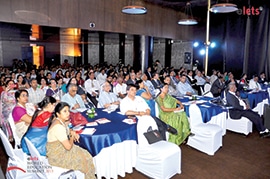 FOCAL POINT: There is a mismatch between the skills given and the skills required in the job market. Most education institutes here have courses on skills to bridge this gap for provision of skill. The strategy for Oman 2040 is investing for more in school education so when they come to higher education, the students have attained the required skills for higher education. I think there is a culture issue here as most people like to pick either a government job or big companies. They do not wish to start their own individual businesses. Most of the population we have is youth, so we have people who go to the job market but we don’t have many who want to leave the jobs. As part of the issue is culture, we as a ministry started a department to study the gap of skills needed for job and provided by the institutions, to see whether they are providing right skills or not, give advice to them to revise the curriculum and build good relations with the industry.
FOCAL POINT: There is a mismatch between the skills given and the skills required in the job market. Most education institutes here have courses on skills to bridge this gap for provision of skill. The strategy for Oman 2040 is investing for more in school education so when they come to higher education, the students have attained the required skills for higher education. I think there is a culture issue here as most people like to pick either a government job or big companies. They do not wish to start their own individual businesses. Most of the population we have is youth, so we have people who go to the job market but we don’t have many who want to leave the jobs. As part of the issue is culture, we as a ministry started a department to study the gap of skills needed for job and provided by the institutions, to see whether they are providing right skills or not, give advice to them to revise the curriculum and build good relations with the industry.In Oman there are two ministries, one is Ministry of School Education and the other is Higher Education. We have 62 higher education institutes, where more than half of them are private ones, and only one government institute called the Sultan Qaboos University that had started in 1986. We give scholarship to students going abroad in our schools
Rishi Khemka, Chief Enjoyment Officer, ARK Infosolutions Pvt Ltd, Mindbox
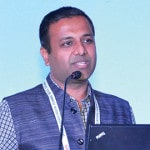 Industry presentation: The most valued asset is our mind and our ability to think and express ourselves. We communicate through thoughts and words, but today it is vital to communicate digitally as well. So, we educators have excelled in making something for the students to imagine, explore, ideate, and create a language to store that. Ideas are organism. If we don’t store them they will die. We need a language to communicate through visual languages as it is the best way to understand.
Industry presentation: The most valued asset is our mind and our ability to think and express ourselves. We communicate through thoughts and words, but today it is vital to communicate digitally as well. So, we educators have excelled in making something for the students to imagine, explore, ideate, and create a language to store that. Ideas are organism. If we don’t store them they will die. We need a language to communicate through visual languages as it is the best way to understand.
Curiosity is first, lots of areas arouse a spark in the child when they see things they want to learn, these part touch children, the moment curiosity is aroused there is willingness to learn. Kids need to have output mechanism, and it can only come if they experience through project based learning and the process of trial and error.
Our design based approach showcases whatever learned is explored. In the project every child creates an individual creation which gets feedback. We strive to have primary hand-on-hand coordination and improving social skills through group pro-activities.
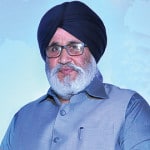 Dr Daljit Singh Cheema, Hon’ble Minister, Department of School Education, Government of Punjab:
Dr Daljit Singh Cheema, Hon’ble Minister, Department of School Education, Government of Punjab:
I feel honoured and privileged to be a part of WES. I appreciate and congratulate ELETS Technomedia Pvt. Ltd. for such an event and I am happy to note that the education summit is focusing on skill development and school, higher and vocational education.
POINTS TO PONDER:
- Emphasis on teacher training in primary education
- Have courses in schools for skill development
- Build a holistic environment that exuberates the creative bent of mind
- Ensure imparting quality education through suitable curriculum for preparation of future vocations
ICT is given prime importance in Punjab, and we have started computer labs in all the secondary and higher secondary government schools. The state also has 3,800 education institutions included in the EDUSAT programme



